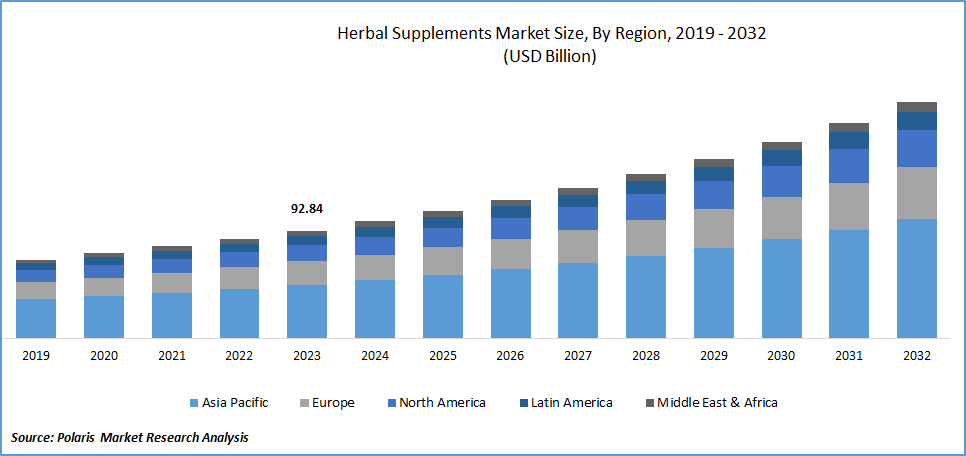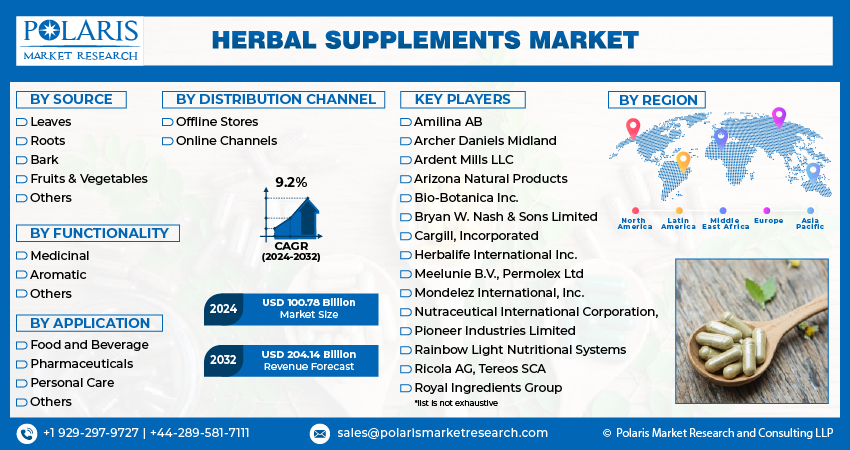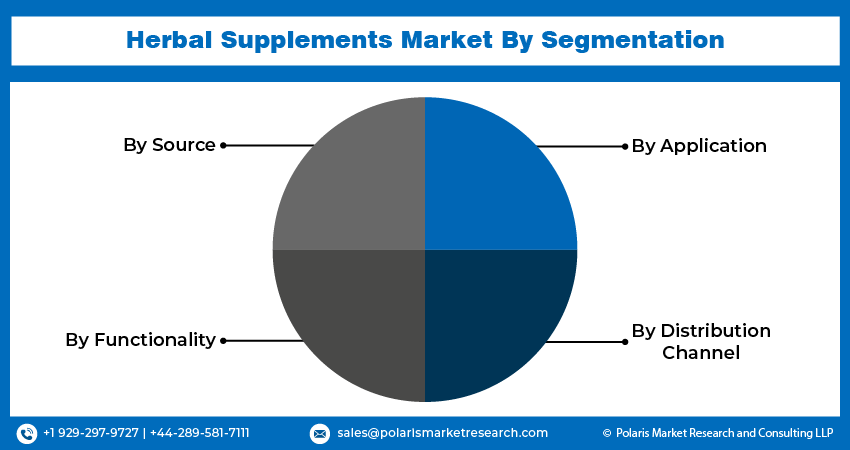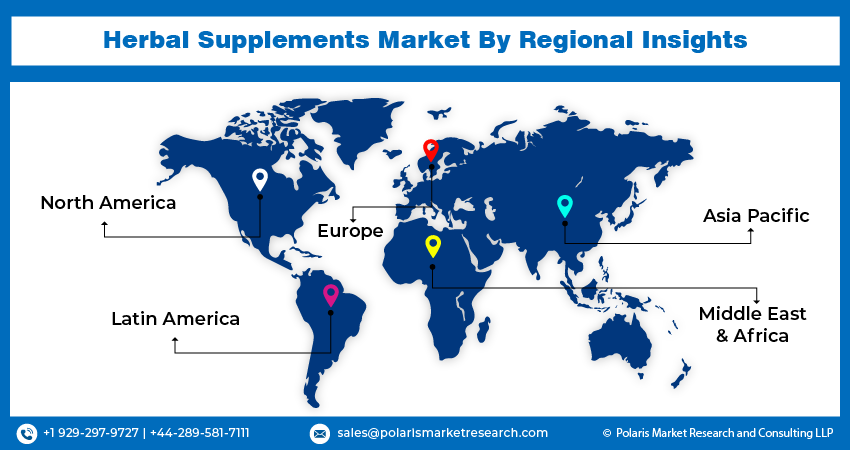
Herbal Supplements Market Share, Size, Trends, & Industry Analysis Report By Source (Leaves, Roots, Bark, Fruits & Vegetables, and Others); By Functionality; By Application; By Distribution Channel; By Region, Segment Forecasts, 2024 - 2032
- Published Date:Jan-2024
- Pages: 119
- Format: PDF
- Report ID: PM1568
- Base Year: 2023
- Historical Data: 2019-2022
Report Outlook
The global herbal supplements market generated USD 92.84 billion in 2023 and is anticipated to grow at a CAGR of 9.2% during the forecast period.
Herbal supplements, also known as botanical products, are dietary supplements that contain one or more herbs. Herbs are parts of plants used to treat health conditions and illnesses. Herbal supplements come in various forms, including tea bags, capsules, tablets, liquids, and powders. They are intended to supplement the diet and contain dietary ingredients such as vitamins, minerals, herbs or other botanicals, and amino acids, among others.
The companies operating in this space have numerous growth opportunities due to the increasing demand from developing nations. The growth of e-commerce, along with the increasing shift of retailers to online platforms, is another significant factor driving the market's growth. The increase in health disorders, coupled with the rising demand for dietary supplements from female and young consumers, is also pushing the market's expansion. The growth in the obese population and the sedentary lifestyles of consumers leading to lifestyle diseases are also driving the market for herbal supplements.

To Understand More About this Research: Request a Free Sample Report
Several factors, including the increasing use of functional foods and rising disposable income, drive the growth of this market. The growing need for consumers to stay healthy is also a significant factor in the market's overall growth. The aging population and growing consumer awareness of preventive healthcare are also contributing to the expansion of this market.
The market research report offers an in-depth analysis of the industry to support informed decision-making. It offers a meticulous breakdown of various market niches and keeps readers updated on the latest industry developments. Along with tracking the Laminated Herbal Supplements Market on the basis of SWOT and Porter’s Five Forces models, the research report includes graphs, tables, charts, and other pictorial representations to help readers understand the key insights and important data easily.
The herbal supplements market, while experiencing overall growth, faces certain hindering factors that impact its market expansion. One significant challenge is the lack of stringent regulations and quality standards governing herbal supplements. Unlike pharmaceuticals, herbal supplements are often classified as dietary supplements, and the regulatory framework can be less precise. This can lead to concerns about product safety, quality, and consistency among consumers, potentially hindering wide acceptance and trust in herbal supplements.

Industry Dynamics
Growth Drivers
Rising Consumer Awareness of the Benefits of Health and Wellness Products
In recent years, there has been a notable shift in consumer preferences toward natural approaches to healthcare products, with an increasing emphasis on preventive measures and well-being. As part of this trend, consumers are becoming more conscious of the potential advantages offered by herbal supplements, which are often perceived as natural, plant-based alternatives to conventional pharmaceuticals.
Consumers are actively seeking products that fit with their preferences for clean labels, transparency, and minimal synthetic ingredients. Herbal supplements, with their roots in traditional medicine and the use of botanical extracts, resemble these preferences. The awareness of the potential health benefits associated with specific herbs, botanicals, and plant extracts has led consumers to incorporate herbal supplements into their daily routines as a bold step toward maintaining or improving their health.
Report Segmentation
The market is primarily segmented based on source, functionality, application, distribution channel, and region.
|
By Source |
By Functionality |
By Application |
By Distribution Channel |
By Region |
|
|
|
|
|
To Understand the Scope of this Report: Speak to Analyst
By Functionality Analysis
Herbal Supplements for Medicinal Functionality Held the Largest Revenue Share in 2023
In 2023, herbal supplements with medicinal functionality emerged as the dominant revenue driver in the herbal supplement market, reflecting a growing consumer preference for natural health solutions. Consumers were seeking alternatives to synthetic pharmaceuticals and were turning to herbal supplements for addressing specific health concerns and promoting overall well-being. Herbal supplements are perceived as natural and often culturally rooted in achieving these goals.
Scientific research and studies supporting the therapeutic benefits of specific herbs have also played a crucial role in driving the popularity of herbal supplements for medicinal purposes. Consumers are increasingly depending on evidence-based information that supports the effectiveness of herbal ingredients in addressing conditions such as immune system support, stress management, and digestive wellness. This scientific validation has enhanced consumer trust and confidence in the medicinal functionality of herbal supplements.
By Distribution Channel Analysis
The Offline Stores Segment is Expected to Hold a Majority of Revenue Share in 2023
The offline stores segment is anticipated to hold a greater revenue share in the global herbal supplement market because of significant traditional retail channels in the distribution of health and wellness products. Consumers often prefer to visit offline retail stores to examine products physically, seek advice from experts, and make immediate purchase decisions. The herbal supplement market, being closely bound with health-conscious consumers, benefits from the personalized guidance that offline stores can provide, fostering trust and credibility.
Also, the offline retail stores for herbal supplements include pharmacies, health food stores, supermarkets, and specialty wellness retailers. These outlets serve as convenient points of access for consumers seeking a diverse range of herbal supplements, offering a one-stop shopping experience. The visibility of herbal supplements on physical shelves allows for better product visibility and discovery, influencing purchasing decisions.

Regional Insights
Asia-Pacific is Expected to Dominate the Market in 2023
Natural products have seen strong growth in the Asia-Pacific market over the last decade. Consumers increasingly demand natural sources for nutritional and cosmetic products. Sustainability brands, antibiotic- and hormone-free ingredients, and local and organic goods will continue to gain market share as consumers seek these green and ethical attributes in their foods and cosmetics to fit a more ‘wellness’ lifestyle approach. Consumers in the region are increasingly inclined to incorporate herbal supplements into their daily routines, seeking alternatives to synthetic pharmaceuticals and embracing a natural approach to well-being. The region's well-developed healthcare infrastructure, coupled with a high level of health and wellness awareness, further fuels the demand for herbal supplements. Along With this, Asia-Pacific has experienced a surge in consumer awareness regarding the potential health benefits of herbal ingredients.
The North America Herbal Supplements market is expected to represent a significant CAGR in the forecast period. The region's regulatory environment plays a significant role in fostering consumer trust in herbal supplements. Regulatory bodies in North America emphasize product labeling, ingredient transparency, and adherence to Good Manufacturing Practices (GMP), creating a favorable environment for manufacturers and importers. Herbal supplements in the North American region are mostly imported from Asian countries, resulting in an increasing consumption rate within the region.

Key Market Players & Competitive Insights
Global companies are expanding into developing markets to increase their customer base, market share, and presence. Leading companies are investing in research and development to introduce innovative herbal supplements that cater to specific health needs. Companies are investing in rigorous quality control measures, adhering to Good Manufacturing Practices (GMP), and obtaining third-party certifications to build consumer trust and differentiate their products in terms of safety and efficacy.
Some of the major players operating in the global Herbal Supplement market include:
- Amilina AB
- Archer Daniels Midland
- Ardent Mills LLC
- Arizona Natural Products
- Bio-Botanica Inc.
- Bryan W. Nash & Sons Limited
- Cargill, Incorporated
- Herbalife International Inc.
- Meelunie B.V.
- Mondelez International, Inc.
- Nutraceutical International Corporation,
- Permolex Ltd
- Pioneer Industries Limited
- Rainbow Light Nutritional Systems
- Ricola AG
- Royal Ingredients Group
- Tereos SCA
- The Himalaya Drug Company
- THE KRAFT HEINZ COMPANY
- Willmar Schwabe GmbH
- Z&F Sungold Corporation
Recent Developments
- In 2019, Archer Daniels Midland acquired Protix, a probiotics manufacturing company, to research and develop natural healthcare supplements for humans and pets.
- In 2022, Herbalife launched a range of meal replacement products that are nutrient-rich and convenient to consume. The range includes shakes, baked pastries, and snacks.
- Nuvothera Inc. announced the launch of a supplemental product in 2019 that includes micronized turmeric. This has led to an increase in beverages containing curcumin. The product is expected to expand the customer base by offering certain health benefits and reducing the need for medication.
- In August 2021, Nestlé Health Science has recently completed the acquisition of the core brands of the Bountiful company, which supplies vitamins, minerals, and herbal supplements. The acquisition is intended to expand Nestlé Health Science's health and nutrition portfolio by adding new brands and sales channels.
Herbal Supplement Market Report Scope
|
Report Attributes |
Details |
|
Market size value in 2024 |
USD 100.78 billion |
|
Revenue Forecast in 2032 |
USD 204.14 billion |
|
CAGR |
9.2% from 2024 – 2032 |
|
Base year |
2023 |
|
Historical data |
2019 – 2022 |
|
Forecast period |
2024 – 2032 |
|
Quantitative units |
Revenue in USD billion and CAGR from 2024 to 2032 |
|
Segments Covered |
By Source, By Functionality, By Application, By Distribution Channel, and By Region |
|
Regional scope |
North America, Europe, Asia Pacific, Latin America, Middle East & Africa |
|
Customization |
Report customization as per your requirements with respect to countries, regions, and segmentation. |
Explore the market dynamics of the 2024 Herbal Supplements Market market share, size, and revenue growth rate, meticulously examined in the insightful reports crafted by Polaris Market Rersearch Industry Reports. The analysis of Herbal Supplements Market extends to a comprehensive market forecast up to 2032, coupled with a retrospective examination. Avail yourself of a complimentary PDF download to sample this in-depth industry analysis.
Browse Our More Top Selling Reports:
Garage Organization and Storage Market Size & Share
Port Equipment Market Size & Share
Inspection Machines Market Size & Share
FAQ's
Ricola AG, Archer Daniels Midland, Nutraceutical International Corporation, Bio-Botanica Inc are the key companies in Herbal Supplements Market
The global herbal supplements market is anticipated to grow at a CAGR of 9.2% during the forecast period
Source, functionality, application, distribution channel, and region are the key segments covered.
Increasing use of functional foods and rising disposable income are the key driving factors in Herbal Supplements Market.
The global Herbal Supplements market size is expected to reach USD 204.14 Billion by 2032
